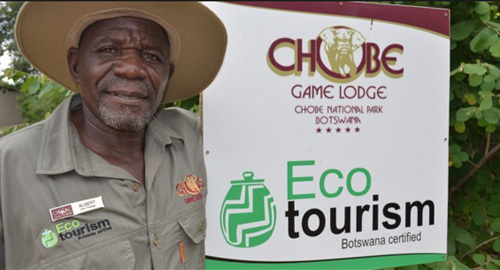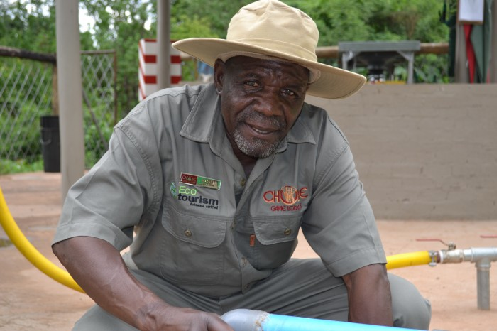|
 |
|
An ecotour at Chobe Hame Lodge with Albert Ndereki (COURTESY OF WWW.CHOBEGAMELODGE.CO.BW) |
When Albert Ndereki first worked at Chobe Game Lodge in 1971, beers were a mere U.S.$ 0.04 cents each and guests were expected to wear formal attire at dinner in the evening. Guests flew directly into Chobe National Park with Botswana Airways (now Air Botswana), landing at Serondela Airstrip by the Chobe River and continued to the lodge on a well-graded road.
Today, he invites us on one of the first Ecotours now offered by Chobe Game Lodge.
From being born in the village of Satau in Northern Botswana to watching Richard Burton serenade Elizabeth Taylor in their private suite after their second wedding, Albert can tell you the stories of how he's watched Botswana evolve from simple beginnings into the premier destination for safari goers around the world.
Albert talks about how challenging it was to establish Chobe Game Lodge, the first 5-star lodge of its kind in Botswana. "Things were very different then, many of the chefs, waiters, managers and other such people came from places like Zimbabwe, South Africa and overseas because there were no trained Batswana to employ" explains Albert.
"You know for the food waste at the lodge we used to dispose of it in a hole at the back of the lodge which we buried. During the Chobe River sunset cruises we used to tie reeds to fish so the guests could see the fish eagles fly down in front of them and take the floating fish."
Albert noticed how the African Fish Eagle spent its days watching the boat waiting for its meal and quickly understood that the lodge had a responsibility to the environment and dreamed of changing how things were done.
The lodge now actively works towards benefitting the environment and boosting the local Chobe community. Albert now oversees the ecotourism initiatives at Chobe Game Lodge, inviting guests to explore the lodge on an ecotour and discover what goes on behind the scenes.
 |
|
Demonstrating the biogas plant to guests on an ecotour (COURTESY OF WWW.CHOBEGAMELODGE.CO.BW) |
Youth awareness
During the ecotour, Albert spends time talking about the community, what he calls the most important asset at Chobe Game Lodge, and how the lodge has invested in empowering Batswana from the region. More than 170 local youngsters have been trained and qualified through the Youth Trainee Development Programme initiated by the lodge in 2006. 18 of the graduates took up positions within Chobe Game Lodge while the others went on to further their career in the tourism industry. "Our company medic 'Doc B' visits regularly to give us check-ups and provide any medicine we may need or even counseling and advice. Every year when the company makes a profit our director calls us together to talk about the year and how we all worked as a team to make it successful. We also receive dividends through the company share scheme. So really for us working at Chobe Game Lodge, it is like being part of a big family community rather than just an employee" says Albert. On the tour, Albert then introduces us to the ecotourism projects taking place at the lodge. Food waste is now processed in a large biogas plant which produces methane for cooking gas in the staff kitchens. Waste water is treated above ground with new technology that ensures all the grey water is safely recycled into irrigation. In fact, through processes involved in the reduction of rubbish, reusing of materials and recycling initiatives in place, less than 5 perecent of the lodge's waste ends up in the Kasane refuse facility.
Electric game vehicles
Albert shows guests the first silent CO2 emission free electric game-drive vehicles and safari boats operating in Botswana. Travelers can now move silently through the Chobe National Park observing wildlife in their natural environment, undisturbed by the rumble of a diesel motor. A far cry from guests waiting on a boat for the Fish Eagle to be fed! But it doesn't stop there. There are so many fascinating initiatives in place that help keep the lodge environment pristine and natural. It's incredible to see what can be achieved with a committed approach to responsible tourism and the ecotour is certainly a refreshing look into the future of safari lodges in Africa. Albert tells us, "If I think back to when I was first offered the job at Chobe Game Lodge in 1971 to what we have now, I am extremely proud and happy to be a part of this place – so much care and attention goes into every part and I really enjoy sharing this with our guests." What a privilege to have such a passionate individual like Albert on a team. Whatever you do, be sure to join him for an ecotour when staying at Chobe Game Lodge.
Contact:
For more information visit http://www.chobegamelodge.com
Or contact enquiries@chobegamelodge.co.bw
Getting there:
There are no direct flights between China and Botswana at present but you can fly into Johannesburg in South Africa from China with a number of international airlines and from there take South African Airways or Air Botswana. Ask your agent for more details. | 